Charles E W Bean, Diaries, AWM38 3DRL 606/268/1 - 1917 - 1936 - Part 6
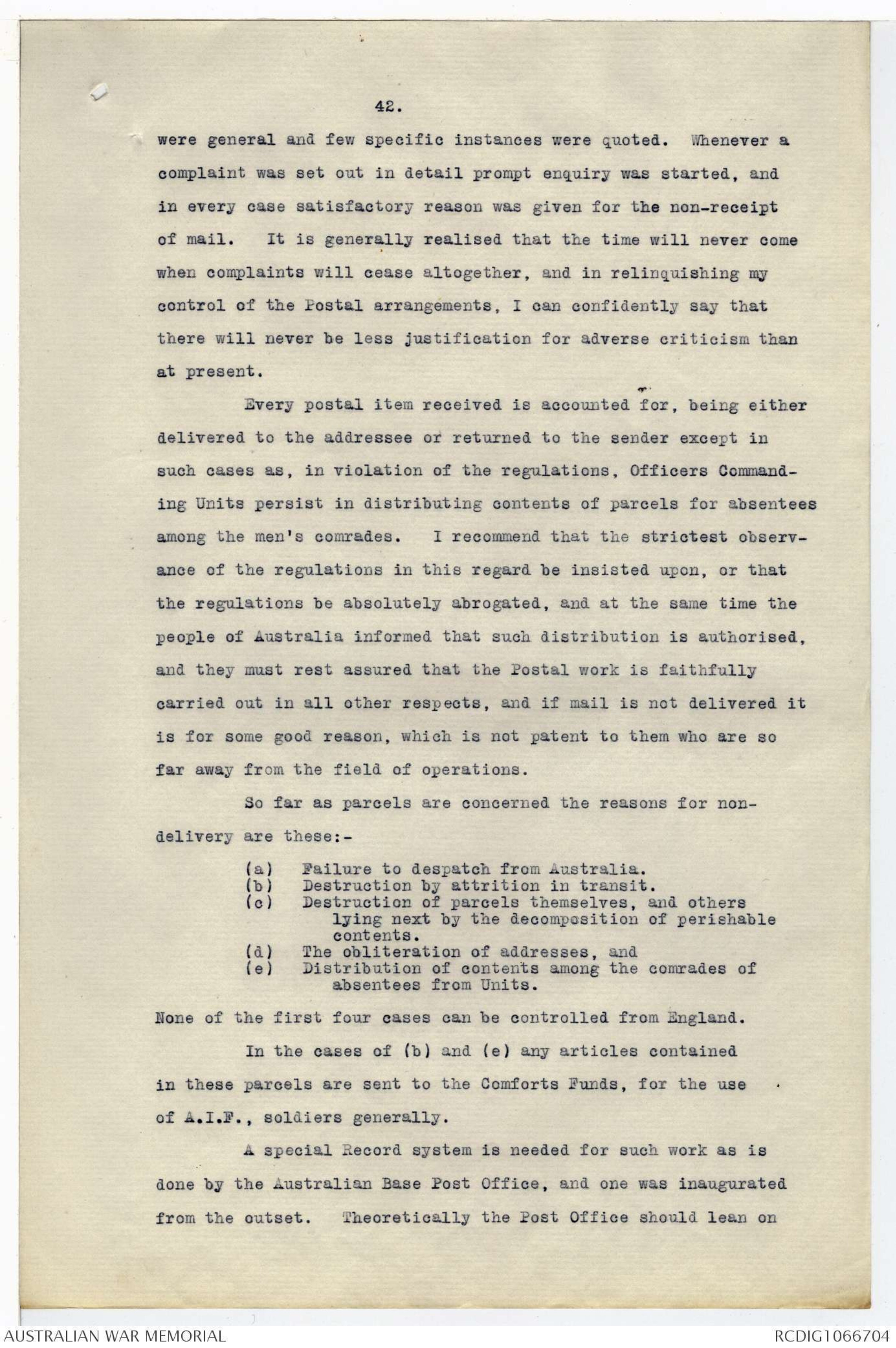
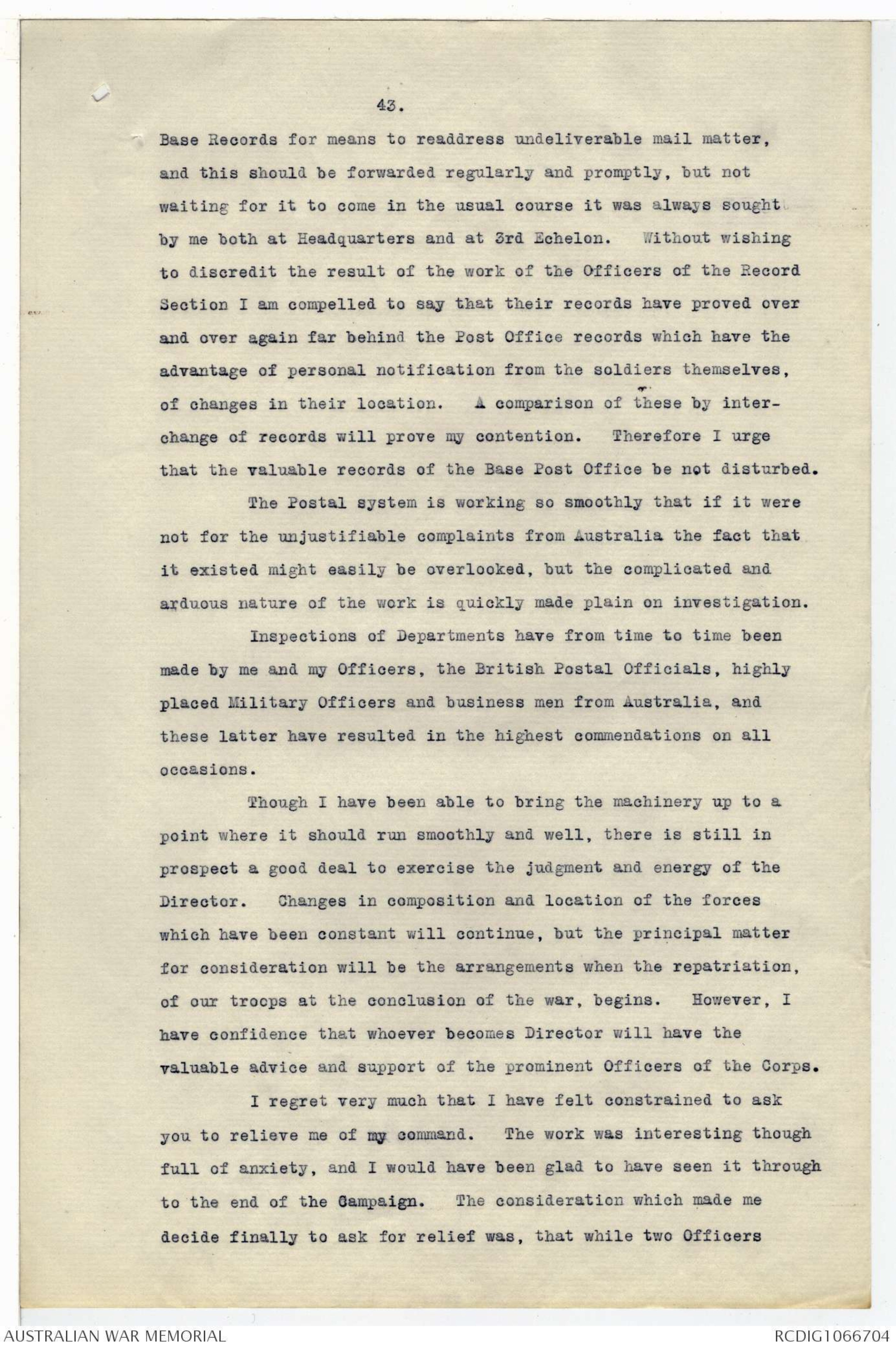
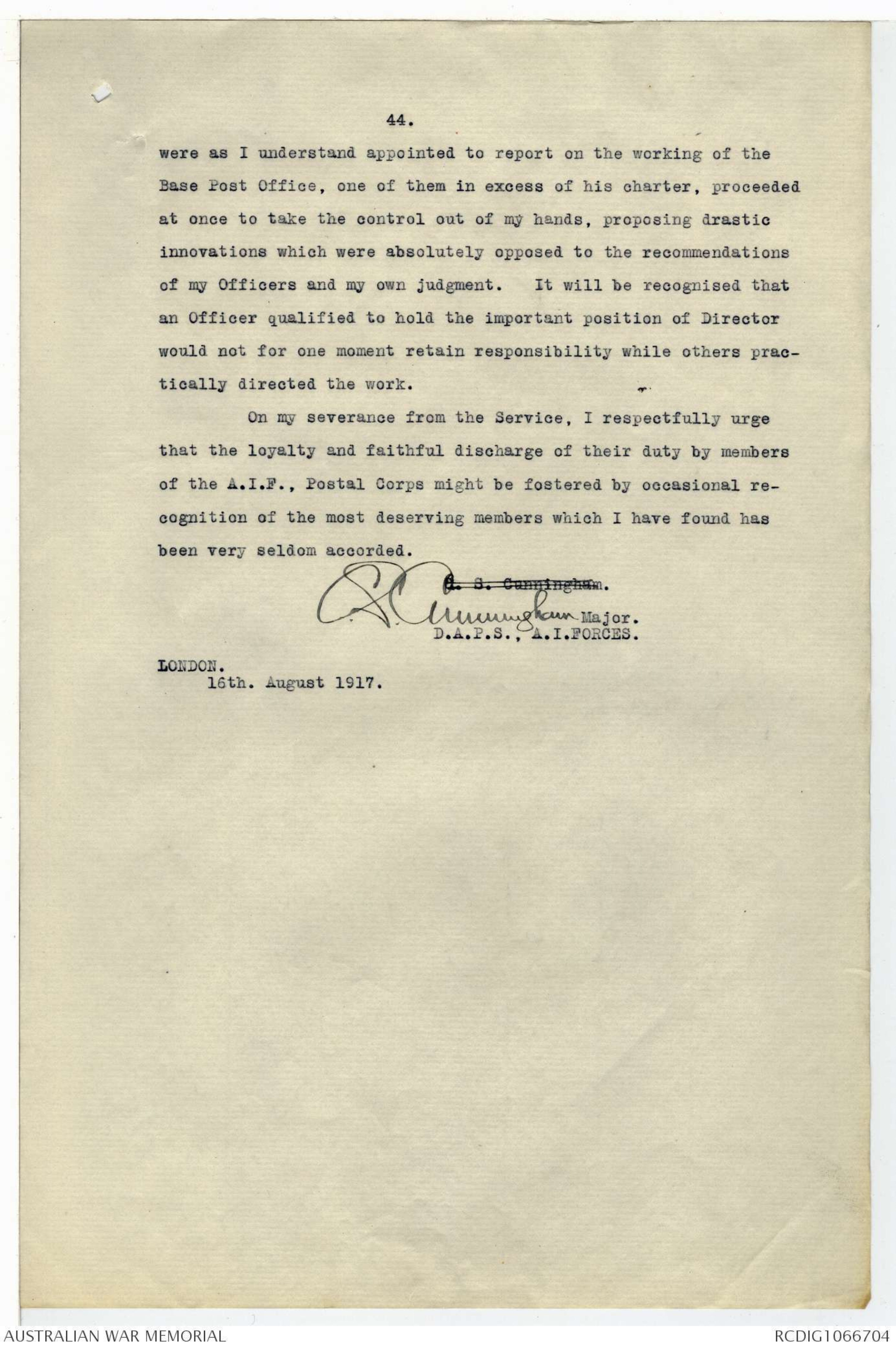
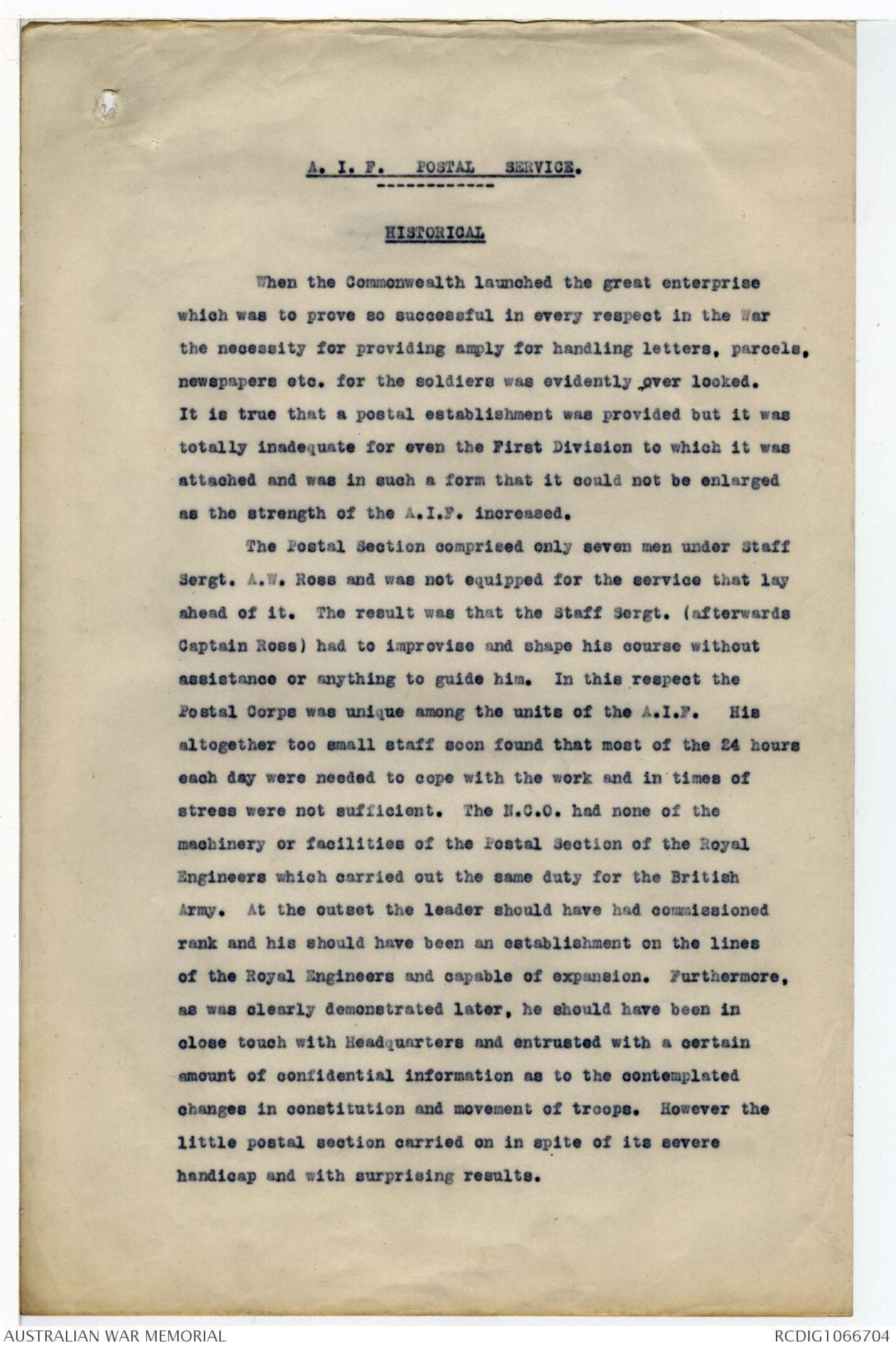
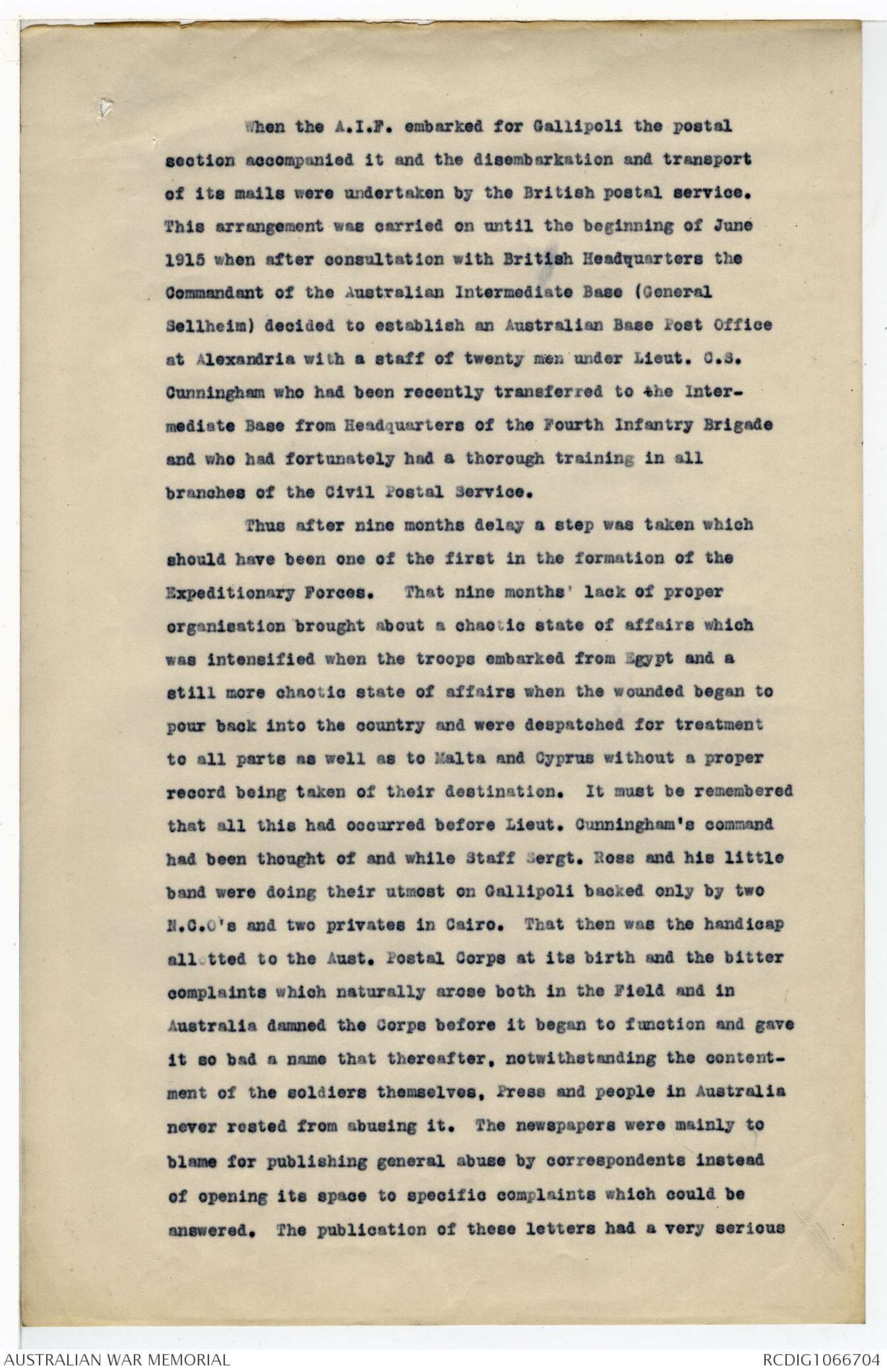
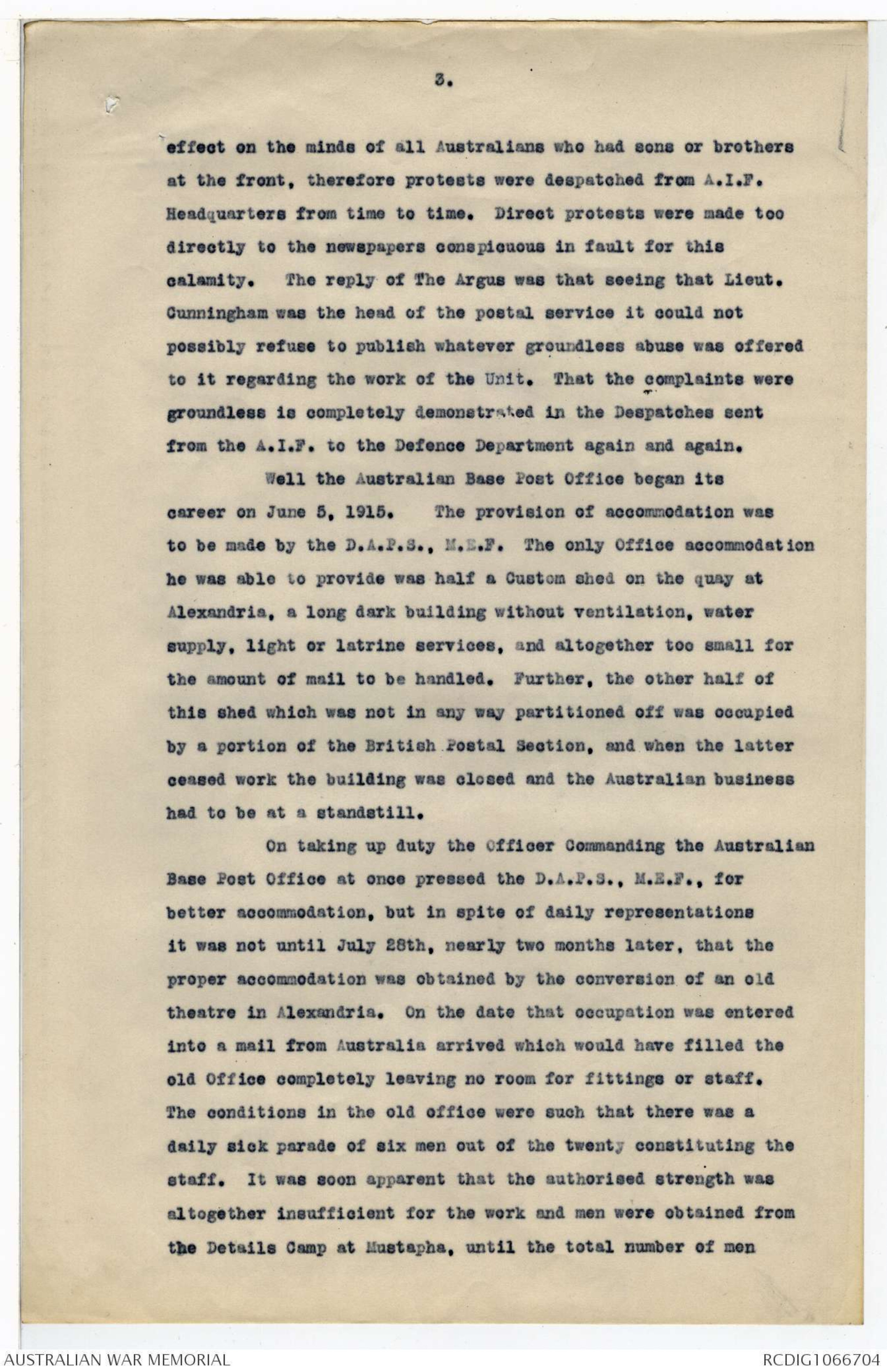
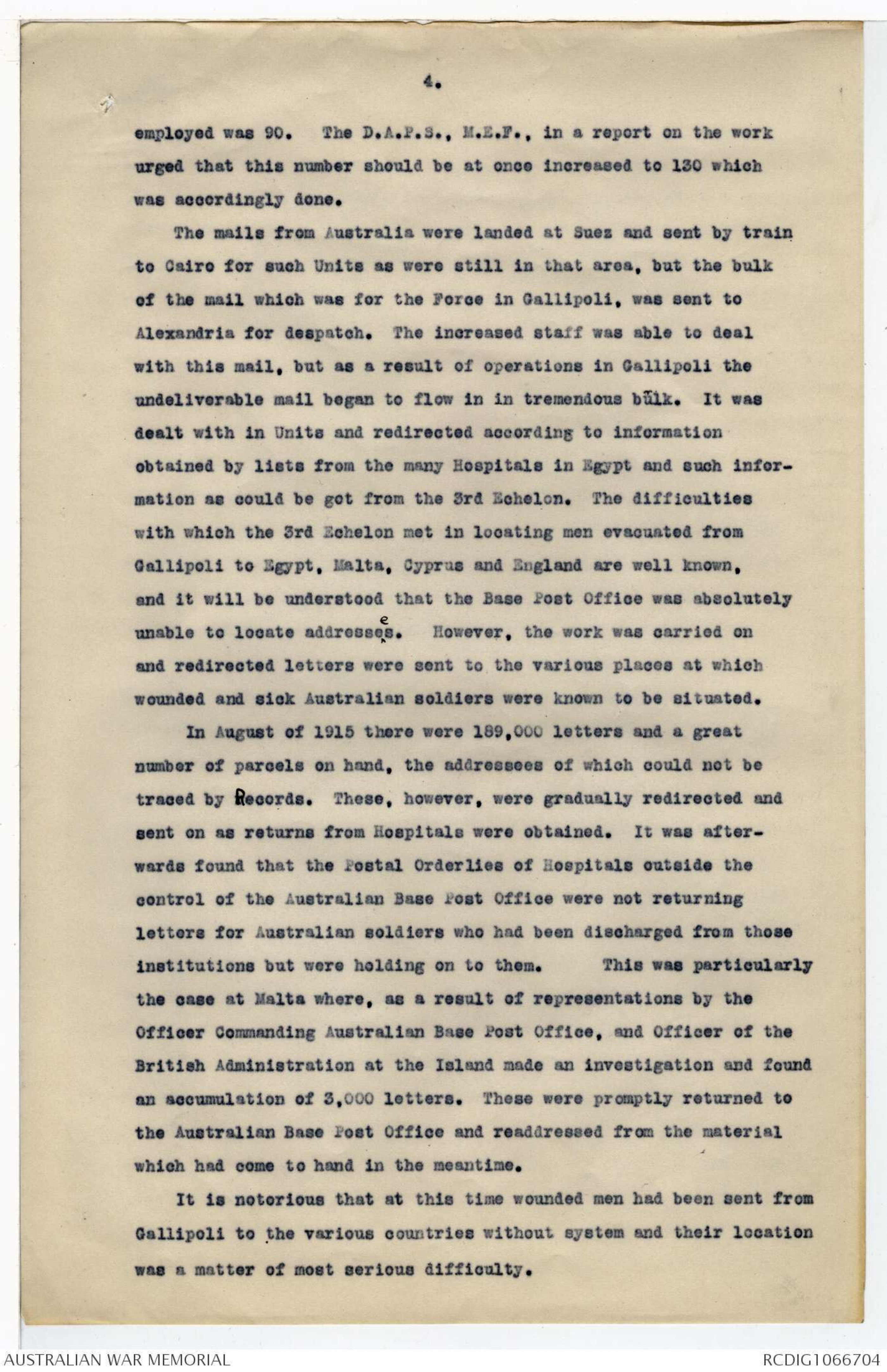
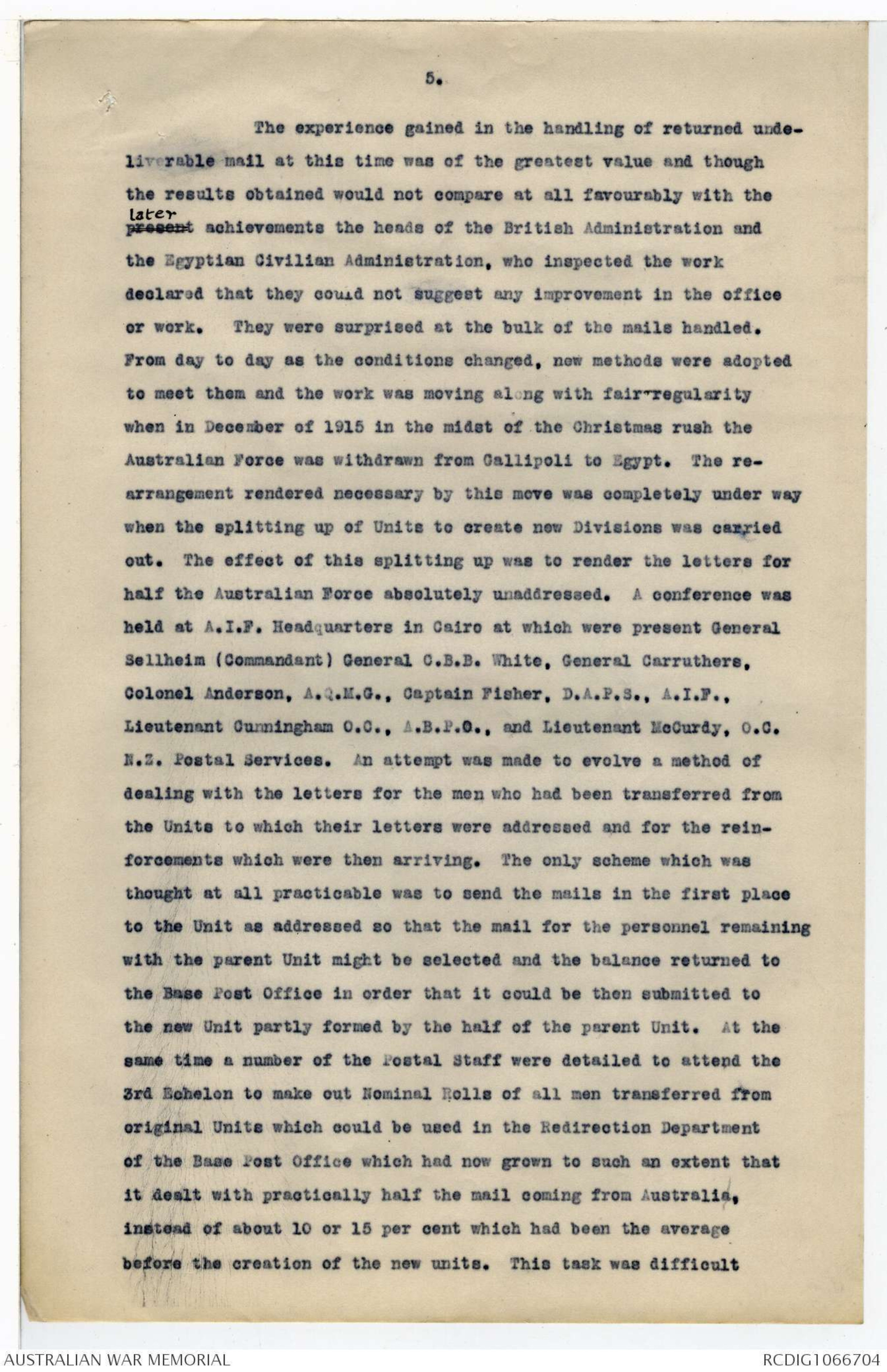
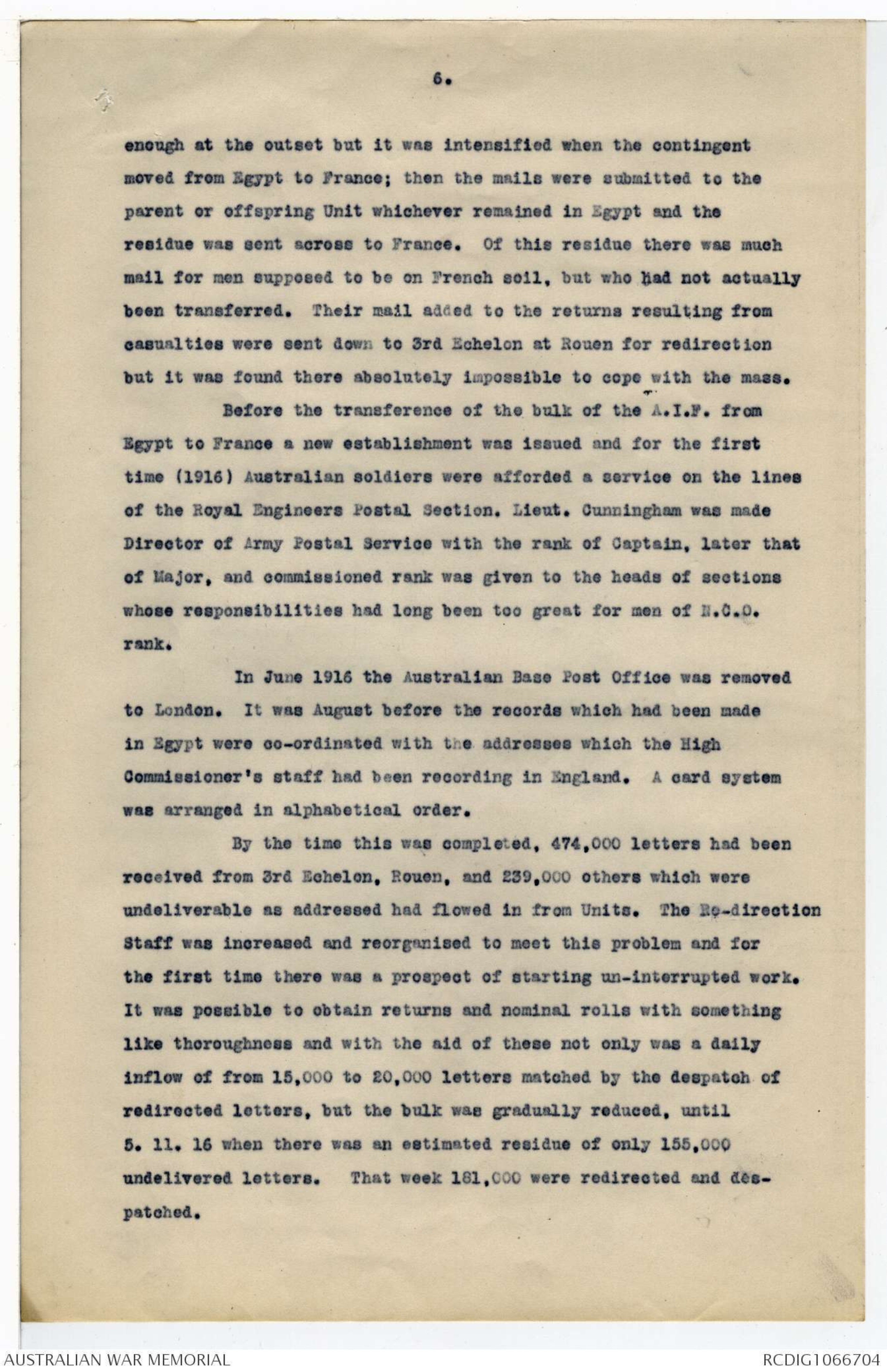
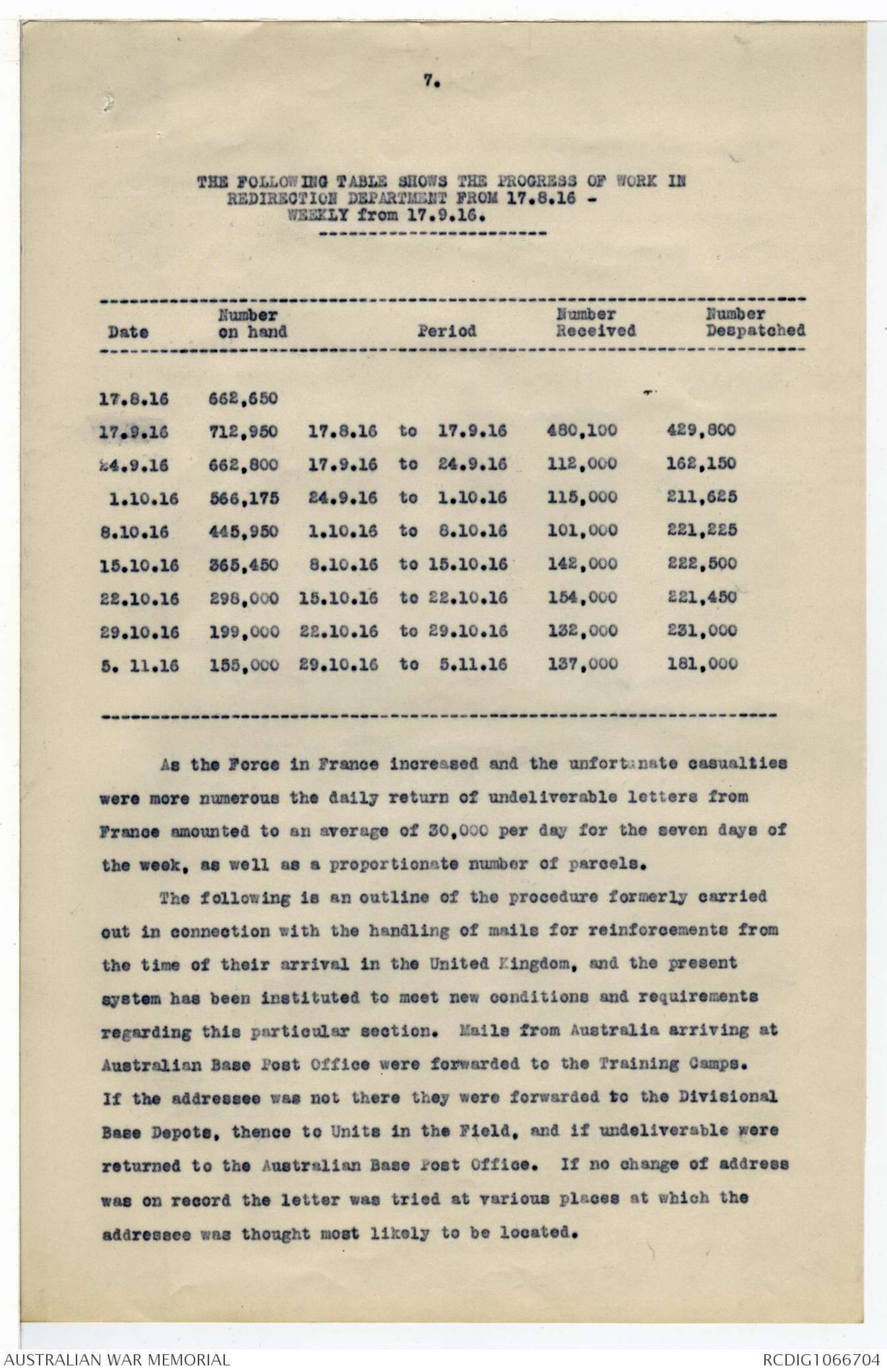
42.
were general and few specific instances were quoted. Whenever a
complaint was set out in detail prompt enquiry was started, and
in every case satisfactory reason was given for the non-receipt
of mail. It is generally realised that the time will never come
when complaints will cease altogether, and in relinquishing my
control of the Postal arrangements, I can confidently say that
there will never be less justification for adverse criticism than
at present.
Every postal item received is accounted for, being either
delivered to the addressee or returned to the sender except in
such cases as, in violation of the regulations. Officers Commanding
Units persist in distributing contents of parcels for absentees
among the men's comrades. I recommend that the strictest observance
of the regulations in this regard be insisted upon, or that
the regulations be absolutely abrogated, and at the same time the
people of Australia informed that such distribution is authorised,
and they must rest assured that the Postal work is faithfully
carried out in all other respects, and if mail is not delivered it
is for some good reason, which is not patent to them who are so
far away from the field of operations.
So far as parcels are concerned the reasons for nondelivery
are these:-
(a) Failure to despatch from Australia.
(b) Destruction by attrition in transit.
(c) Destruction of parcels themselves, and others
lying next by the decomposition of perishable
contents.
d) The obliteration of addresses, and
e) Distribution of contents among the comrades of
absentees from Units.
None of the first four cases can be controlled from England.
In the cases of (b) and (e) any articles contained
in these parcels are sent to the Comforts Funds, for the use
of A.I.F., soldiers generally.
A special Record system is needed for such work as is
done by the Australian Base Post Office, and one was inaugurated
from the outset. Theoretically the Post Office should lean on
43.
Base Records for means to readdress undeliverable mail matter,
and this should be forwarded regularly and promptly, but not
waiting for it to come in the usual course it was always sought
by me both at Headquarters and at 3rd Echelon. Without wishing
to discredit the result of the work of the Officers of the Record
Section I am compelled to say that their records have proved over
and over again far behind the Post Office records which have the
advantage of personal notification from the soldiers themselves,
of changes in their location. A comparison of these by interchange
of records will prove my contention. Therefore I urge
that the valuable records of the Base Post Office be not disturbed.
The Postal system is working so smoothly that if it were
not for the unjustifiable complaints from Australia the fact that
it existed might easily be overlooked, but the complicated and
arduous nature of the work is quickly made plain on investigation.
Inspections of Departments have from time to time been
made by me and my Officers, the British Postal Officials, highly
placed Military Officers, and business men from Australia, and
these latter have resulted in the highest commendations on all
occasions.
Though I have been able to bring the machinery up to a
point where it should run smoothly and well, there is still in
prospect a good deal to exercise the judgement and energy of the
Director. Changes in composition and location of the forces
which have been constant will continue, but the principal matter
for consideration will be the arrangements when the repatriation,
of our troops at the conclusion of the war, begins. However, I
have confidence that whoever becomes Director will have the
valuable advice and support of the prominent Officers of the Corps.
I regret very much that I have felt constrained to ask
you to relieve me of my command. The work was interesting though
full of anxiety, and I would have been glad to have seen it through
to the end of the Campaign. The consideration which made me
decide finally to ask for relief was, that while two Officers
44.
were as I understand appointed to report on the working of the
Base Post Office, one of them in excess of his charter, proceeded
at once to take the control out of my hands, proposing drastic
innovations which were absolutely opposed to the recommendations
of my Officers and my own judgement. It will be recognised that
an Officer qualified to hold the important position of Director
would not for one moment retain responsibility while others practically
directed the work.
On my severance from the Service, I respectfully urge
that the loyalty and faithful discharge of their duty by members
of the A.I.F., Postal Corps might be fostered by occasional recognition
of the most deserving members which I have found has
been very seldom accorded.C.S.Cunningham.
C.S.Cunningham Major.
D.A.P.S, A.I.FORCES.
LONDON.
16th. August 1917.
A.I.F. POSTAL SERVICE.
HISTORICAL
When the Commonwealth launched the great enterprise
which was to prove so successful in every respect in the War
the necessity for providing amply for handling letters, parcels,
newspapers etc. for the soldiers was evidently over looked.
It is true that a postal establishment was provide but it was
totally inadequate for even the First Division to which it was
attached and was in such a form that it could not be enlarged
as the strength of the A.I.F. increased.
The Postal Section comprised only seven men under Staff
Sergt. A.W. Ross and was not equipped for the service that lay
ahead of it. The result was that the Staff Sergt. (afterwards
Captain Ross) had to improvise and shape his course without
assistance or anything to guide him. In this respect
the Postal Corps was unique among the units of the A.I.F. His
altogether too small staff soon found that most of the 24 hours
each day were needed to cope with the work and in times of
stress were not sufficient. The N.C.O. had none of the
machinery or facilities of the Postal Section of the Royal
Engineers which carried out the same duty for the British
Army. At the outset the leader should have had commissioned
ranked and his should have been an establishment on the lines
of the Royal Engineers and capable of expansion. Furthermore,
as was clearly demonstrated later, he should have been in
close touch with Headquarters and entrusted with a certain
amount of confidential information as to the contemplated
changes in constitution and movement of troops. However the
little postal section carried on in spite of its severe
handicap and with surprising results.
When the A.I.F. embarked for Gallipoli the postal
section accompanied it and the disembarkation and transport
of its mails were undertaken by the British postal service.
This arrangement was carried on until the beginning of June
1915 when after consultation with British Headquarters the
Commandant of the Australian Intermediate Base (General
Sellheim) decided to establish an Australian Base Post Office
at Alexandria with a staff of twenty men under Lieut. C.S.
Cunningham who had been recently transferred to the Intermediate
Base from Headquarters of the Fourth Infantry Brigade
and who had fortunately had a thorough training in all
branches of the Civil Postal Service.
Thus after nine months delay a step was taken which
should have been one of the first in the formation of the
Expeditionary Forces. That nine months' lack of proper
organisation brought about a chaotic state of affairs which
was intensified when the troops embarked from Egypt and a
still more chaotic state of affairs when the wounded began to
pour back into the country and were despatched for treatment
to all parts as well as to Malta and Cyprus without a proper
record being taken of their destination. It must be remembered
that all this had occurred before Lieut. Cunningham's command
had been thought of and while Staff Sergt. Rose and his little
band were doing their utmost on Gallipoli backed only by two
N.C.O's and two privates in Cairo. That then was the handicap
allotted to the Aust. Postal Corps at its birth and the bitter
complaints which naturally across both in the Field and in
Australia damned the Corps before it began to function and gave
it so bad a name that thereafter, not withstanding the contentment
of the soldiers themselves, Press and people in Australia
never rested from abusing it. The newspapers were mainly to
blame for publishing general abuse by correspondents instead
of opening its space to specific complaints which could be
answered. The publication of these letters had a very serious
3.
effect on the minds of all Australians who had sons or brothers
at the front, therefore protests were despatched from A.I.F.
Headquarters from time to time. Direct protests were made too
directly to the newspapers conspicuous in fault for this
calamity. The reply of The Argus was that seeing that Lieut.
Cunningham was the head of the postal service it could not
possibly refuse to publish whatever groundless abuse was offered
to it regarding the work of the Unit. That the complains were
groundless is completely demonstrated in the Despatches
sent from the A.I.F. to the Defence Department again and again.
Well the Australian Base Post Office began its
career on June 5, 1915. The provision of accommodation was
to be made by the D.A.P.S., M.E.F. The only Office accommodation
he was able to provide was half a Custom shed on the quay at
Alexandria, a long dark building without ventilation, water
supply, light or latrine services, and altogether too small for
the amount of mail to be handled. Further, the other half of
this shed which was not in any way partitioned off was occupied
by a portion of the British Postal Section, and when the latter
ceased work the building was closed and the Australian business
had to be at a standstill.
On taking up duty the Officer Commanding the Australian
Base Post Office at once pressed the D.A.P.S., M.E.F., for
better accommodation, but in spite of daily representations
it was not until July 26th, nearly two months later, that the
proper accommodation was obtained by the conversion of an old
theatre in Alexandria. On the date that occupation was entered
into a mail from Australia arrived which would have filled the
old Office completely leaving no room for fittings or staff.
The conditions in the old office were such that there was a
daily sick parade of six men out of the twenty constituting the
staff. It was soon apparent that the authorised strength was
altogether insufficient for the work and men were obtained from
the Details Camp at Mustapha, until the total number of men
4.
employed was 90. The D.A.P.S, M.E.F., in a report on the work
urged that this number should be at once increased to 130 which
was accordingly done.
The mails from Australia were landed at Suez and sent by train
to Cairo for such Units as were still in that area, but the bulk
of the mail which was for the Force in Gallipoli, was sent to
Alexandria for despatch. The increased staff was able to deal
with this mail, but as a result of operations in Gallipoli the
undeliverable mail began to flow in in tremendous bulk. It was
dealt with in Units and redirected according to information
obtained by lists from the many Hospitals in Egypt and such information
as could be got from the 3rd Echelon. The difficulties
with which the 3rd Echelon met in locating men evacuated from
Gallipoli to Egypt, Malta, Cyprus and England are well known,
and it will be understood that the Base Post Office was absolutely
unable to locate addresse^(e)s. However, the work was carried on
and redirected letters were sent to the various places at which
wounded and sick Australian soldiers were known to be situated.
In August of 1915 there were 189,000 letters and a great
number of parcels on hand, the addressees of which could not be
traced by rRecords. These, however, were gradually redirected and
sent on as returns from Hospitals were obtained. It was afterwards
found that the Postal Orderlies of Hospitals outside the
control of the Australian Base Post Office were not returning
letters for Australian soldiers who had been discharged from those
institutions but were holding on to them. This was particularly
the case at Malta where, as a result of representations by the
Officer Commanding Australian Base Post Office, and Officer of the
British Administration at the Island made an investigation and found
an accumulation of 3,000 letters. These were promptly returned to
the Australian Base Post Office and readdressed from the material
which had come to hand in the meantime.
It is notorious that at this time wounded mend had ben sent from
Gallipoli to the various countries without system and their location
was a matter of most serious difficulty.
5.
The experience gained in the handling of returned undeliverable
mail at this time was of the greatest value and though
the results obtained would not compare at all favourably with the
presentlater achievements the heads of the British Administration and
the Egyptian Civilian Administration, who inspected the work
declared that they could not suggest any improvement in the office
or work. They were surprised at the bulk of the mails handled.
From day to day as the conditions changed, new methods were adopted
to meet them and the work was moving along with fair regularity
when in December of 1915 in the midst of the Christmas rush the
Australian Force was withdrawn from Gallipoli to Egypt. The rearrangement
rendered necessary by this move was completely under way
when the splitting up of Units to create new Divisions was carried
out. The effect of this splitting up was to render the letters for
half the Australian Force absolutely unaddressed. A conference was
held at A.I.F. Headquarters in Cairo at which were present General
Sellheim (Commandant) General C.B.B. White, General Carruthers,
Colonel Anderson, A.Q.M.G., Captain Fisher, D.A.P.S., A.I.F.,
Lieutenant Cunningham O.C., A.B.P.O., and Lieutenant McCurdy, O.C.
N.Z Postal Services. An attempt was made to evolve a method of
dealing with the letters for the men who had been transferred from
the Units to which their letter were addressed and for the reinforcements
which were then arriving. The only scheme which was
thought of at all practicable was to send the mails in the first place
to the Unit as addressed so that the mail for the personnel remaining
with the parent Unit might be selected and the balance returned to
the Base Post Office in order that it could be then submitted to
the new Unit partly formed by the half of the parent Unit. At the
same time a number of the Postal Staff were detailed to attend the
3rd Echelon to make out Nominal Rolls of all men transferred from
original Units which could be used int he Redirection Department
of the Base Post Office which had no grown to such an extent that
it dealt with practically half the mail coming from Australia,
instead of about 10 or 15 per cent which had been the average
before the creation of the new units. This task was difficult
6.
enough at the outset but it was intensified when the contingent
moved from Egypt to France; then the mails were submitted to the
parent of offspring Unit whichever remained in Egypt and the
residue was sent across to France. Of this residue there was much
mail for men supported to be on French soil, but who had not actually
been transferred. Their mail added to the returns resulting from
casualties were sent down to 3rd Echelon at Rouen for redirection
but it was found there absolutely impossible to cope with the mass.
Before the transference of the bulk of the A.I.F. from
Egypt to France a new establishment was issues and for the first
time (1916) Australian soldiers were afforded a service on the lines
of the Royal Engineers Postal Section. Lieut. Cunningham was made
Director of Army Postal Service with the rank of Captain, later that
of Major, and commissioned rank was given to the heads of sections
whose responsibilities had long been too great for men of N.C.O.
rank.
In June 1916 the Australian Base Post Office was removed
to London. It was August before the records which had been made
in Egypt were co-ordinated with the addresses which the High
Commissioner's staff had been recording in England. A card system
was arranged in alphabetical order.
By the time this was completed, 474,000 letters had been
received from 3rd Echelon, Rouen, and 239,000 others which were
undeliverable as addressed had flowed in from Units. The Re-direction
Staff was increased and reorganised to meet this problem and for
the first time there was a prospect of starting un-interrupted work.
It was possible to obtain returns and nominal rolls with something
like thoroughness and with the aid of these not only was a daily
inflow of from 15,000 to 20,000 letters matched by the despatch of
redirected letters, but the bulk was gradually reduced, until
5. 11. 16 when there was an estimated residue of only 155,000
undelivered letters. That week 161,000 were redirected and despatched.
7.
THE FOLLOWING TABLE SHOWS THE PROGRESS OF WORK IN REDIRECTION DEPARTMENT FROM 17.8.16 -
WEEKLY from 17.9.16.
| Date | Number of hand | Period | Number Received | Number Despatched |
| 17.8.16 | 662,650 | |||
| 17.9.16 | 712,950 | 17.8.16 to 17.9.16 | 480,100 | 429,800 |
| 24.9.16 | 662,800 | 17.9.16 to 24.9.16 | 112,000 | 162,150 |
| 1.10.16 | 566,175 | 24.9.16 to 1.10.16 | 115,000 | 211,625 |
| 8.10.16 | 445,950 | 1.10.16 to 8.10.16 | 101,000 | 221,225 |
| 15.10.16 | 365,450 | 8.10.16 to 15.10.16 | 142,000 | 222,500 |
| 22.10.16 | 298,000 | 15.10.16 to 22.10.16 | 154,000 | 221,450 |
| 29.10.16 | 199,000 | 22.10.16 to 29.10.16 | 132,000 | 231,000 |
| 5.11.16 | 155,000 | 29.10.16 to 5.11.16 | 137,000 | 181,000 |
As the Force in France increased and the unfortunate casualties
were more numerous the daily return of undeliverable letters from
France amounted to an average of 30,000 per day for the seven days of
the week, as well as a proportionate number of parcels.
The following is an outline of the procedure formerly carried
out in connection with the handling of mails for reinforcements from
the time of their arrival in the United Kingdom, and the present
system had been institude to meet new conditions and requirements
regarding this particular section. Mails from Australia arriving at
Australian Base Post Office were forwarded to the Training Camps.
If the addressee was not there they were forwarded to the Divisional
Base Depots, thence to Units in the Field, and if undeliverable were
returned to the Australian Base Post Office. If not change of address
was on record the letter was tried at various places at which the
addressee was thought most likely to be located.
 Sam scott
Sam scottThis transcription item is now locked to you for editing. To release the lock either Save your changes or Cancel.
This lock will be automatically released after 60 minutes of inactivity.